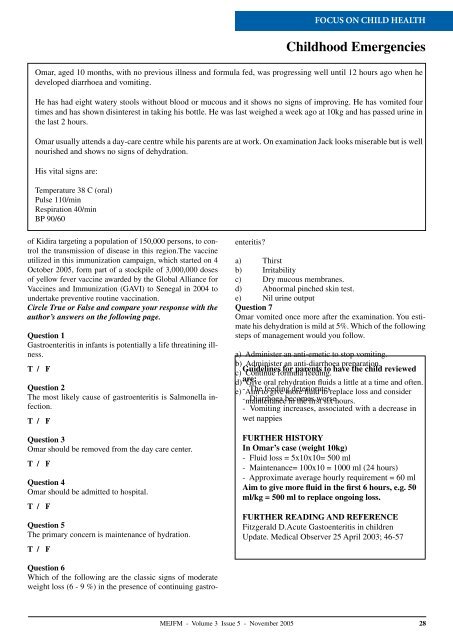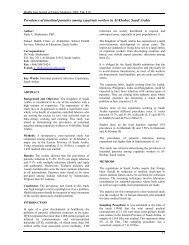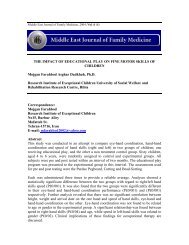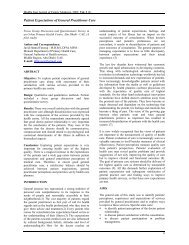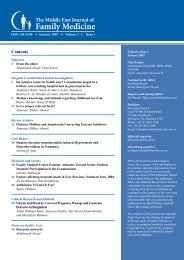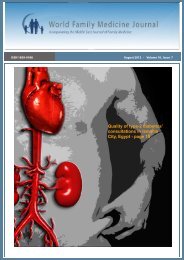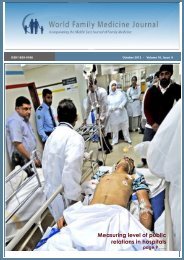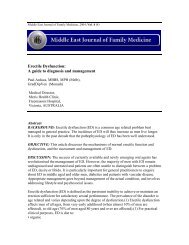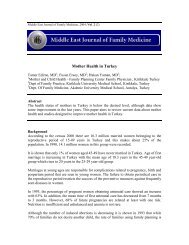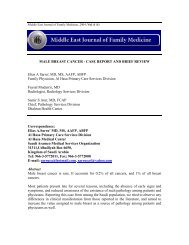Contents - Middle East Journal of Family Medicine
Contents - Middle East Journal of Family Medicine
Contents - Middle East Journal of Family Medicine
You also want an ePaper? Increase the reach of your titles
YUMPU automatically turns print PDFs into web optimized ePapers that Google loves.
FOCUS ON CHILD HEALTH<br />
Childhood Emergencies<br />
Omar, aged 10 months, with no previous illness and formula fed, was progressing well until 12 hours ago when he<br />
developed diarrhoea and vomiting.<br />
He has had eight watery stools without blood or mucous and it shows no signs <strong>of</strong> improving. He has vomited four<br />
times and has shown disinterest in taking his bottle. He was last weighed a week ago at 10kg and has passed urine in<br />
the last 2 hours.<br />
Omar usually attends a day-care centre while his parents are at work. On examination Jack looks miserable but is well<br />
nourished and shows no signs <strong>of</strong> dehydration.<br />
His vital signs are:<br />
Temperature 38 C (oral)<br />
Pulse 110/min<br />
Respiration 40/min<br />
BP 90/60<br />
<strong>of</strong> Kidira targeting a population <strong>of</strong> 150,000 persons, to control<br />
the transmission <strong>of</strong> disease in this region.The vaccine<br />
utilized in this immunization campaign, which started on 4<br />
October 2005, form part <strong>of</strong> a stockpile <strong>of</strong> 3,000,000 doses<br />
<strong>of</strong> yellow fever vaccine awarded by the Global Alliance for<br />
Vaccines and Immunization (GAVI) to Senegal in 2004 to<br />
undertake preventive routine vaccination.<br />
Circle True or False and compare your response with the<br />
author’s answers on the following page.<br />
Question 1<br />
Gastroenteritis in infants is potentially a life threatining illness.<br />
T / F<br />
Question 2<br />
The most likely cause <strong>of</strong> gastroenteritis is Salmonella infection.<br />
T / F<br />
Question 3<br />
Omar should be removed from the day care center.<br />
T / F<br />
Question 4<br />
Omar should be admitted to hospital.<br />
T / F<br />
Question 5<br />
The primary concern is maintenance <strong>of</strong> hydration.<br />
T / F<br />
Question 6<br />
Which <strong>of</strong> the following are the classic signs <strong>of</strong> moderate<br />
weight loss (6 - 9 %) in the presence <strong>of</strong> continuing gastroenteritis<br />
a) Thirst<br />
b) Irritability<br />
c) Dry mucous membranes.<br />
d) Abnormal pinched skin test.<br />
e) Nil urine output<br />
Question 7<br />
Omar vomited once more after the examination. You estimate<br />
his dehydration is mild at 5%. Which <strong>of</strong> the following<br />
steps <strong>of</strong> management would you follow.<br />
a) Administer an anti-emetic to stop vomiting.<br />
b) Administer an anti-diarrhoea preparation.<br />
c)<br />
Guidelines<br />
Continue formula<br />
for parents<br />
feeding.<br />
to have the child reviewed<br />
d)<br />
are:<br />
Give oral rehydration fluids a little at a time and <strong>of</strong>ten.<br />
e) - Aim The to feeding give more deteriorates fluid to replace loss and consider<br />
- maintenance Diarrhoea becomes in the first worse six hours.<br />
- Vomiting increases, associated with a decrease in<br />
wet nappies<br />
FURTHER HISTORY<br />
In Omar’s case (weight 10kg)<br />
- Fluid loss = 5x10x10= 500 ml<br />
- Maintenance= 100x10 = 1000 ml (24 hours)<br />
- Approximate average hourly requirement = 60 ml<br />
Aim to give more fluid in the first 6 hours, e.g. 50<br />
ml/kg = 500 ml to replace ongoing loss.<br />
FURTHER READING AND REFERENCE<br />
Fitzgerald D.Acute Gastoenteritis in children<br />
Update. Medical Observer 25 April 2003; 46-57<br />
MEJFM - Volume 3 Issue 5 - November 2005<br />
28


